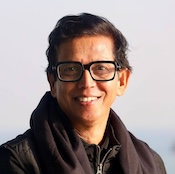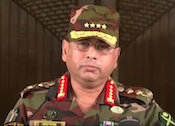By Mujtoba Ahmed Murshed
The writer is an analyst, researcher, and journalist. He has served in Japan and Germany’s foreign ministries and worked as the Advisor at the Bay of Bengal Initiative for Multi-Sectoral Technical and Economic Cooperation (BIMSTEC).
DHAKA, Bangladesh | 14 March 2025 (IDN) — In the aftermath of Bangladesh’s political transition on August 5, last year, international discussions surrounding the country’s governance and military stance have intensified. A recent statement by UN High Commissioner for Human Rights Volker Turk has sparked debate, bringing renewed attention to the role of the Bangladesh Army during the student-led protests in July and August.

During an interview on BBC’s HARDtalk on March 5, Turk shared that the United Nations had advised the Bangladesh military against intervening in the protests, cautioning that any involvement could jeopardize the country’s participation in UN peacekeeping missions. “We actually gave the warning to the army that if they get involved, it means they may not be able to be a troop-contributing country anymore,” Turk stated. He further suggested that this warning may have influenced the military’s actions and coincided with the transition of leadership to Dr. Muhammad Yunus as chief adviser of the interim administration.
However, the situation on the ground in August presents a more complex picture. Indeed, on August 3, Army Chief General Waqar publicly affirmed, “No more shooting, because students have the right to protest.” Reports indicate that the alleged UN warning, referenced by Turk, was issued late on the night of August 4 or early on August 5.
Meanwhile, from the outset of the army’s deployment in July-August, General Waqar had emphasized restraint, instructing troops to act with patience while safeguarding both civilians and government infrastructure. The Bangladesh Army has consistently prioritized human rights and remains committed to upholding its responsibilities in this regard.
But Turk’s statement has led to varying interpretations, i.e. supporters of the political transition argue that the military’s actions were, in part, shaped by UN warnings, reinforcing the notion that Bangladesh’s armed forces were under international scrutiny.
As we all know, Bangladesh has been a key contributor to UN peacekeeping missions since 1988, sending thousands of personnel to various conflict zones. According to UN reports, the country ranks among the largest providers of uniformed peacekeepers, highlighting its significant role in maintaining global stability. Given this, the possibility of exclusion from peacekeeping operations represents a serious concern, as these missions provide both international prestige and economic benefits.
Despite Turk’s remarks, I stand with all critics who argue that the Bangladesh Army operates independently and remains focused on national interests. The Bangladesh Army is a professional force, dedicated to serving the nation. UN job-related pressure was never a factor in ensuring that they acted in the country’s best interests.
Nevertheless, Turk’s statement raises important questions. Was the military’s stance purely a matter of internal strategy, or was it influenced by external forces? If the latter is true, it could indicate broader international involvement in Bangladesh’s internal affairs.
With my decades of experience in the Japanese and German foreign ministries, I must say that Volker Turk has no legal authority to dictate such matters. This unsolicited statement appears to be very purposefully timed.
Very prominently, shortly before Turk’s statement, Bangladesh’s Chief of Army Staff, General Waker-Uz-Zaman, issued a stern warning about national unity. “I am warning you. If you cannot forget your differences and work together—if you engage in mudslinging and fighting—the independence and sovereignty of this country and nation will be at stake,” he declared. “I am telling you today; otherwise, you would say that I did not warn you. This country belongs to all of us. We all want to live in peace and harmony. We do not want conflicts or fights. We are working towards that goal.”

General Waker-Uz-Zaman’s words marked the first significant public statement from the military’s top leadership following Sheikh Hasina’s removal. Many interpreted it as a sign of the army’s commitment to national stability rather than allegiance to any political faction that has now gained prominence on the ground.
The timing of Turk’s statement also coincides with increasing scrutiny of international involvement in Bangladesh’s political landscape. Recently, former US President Donald Trump criticized a $29 million USAID project in Bangladesh, questioning its allocation to a little-known firm. During a speech at the White House, he remarked, “$29 million to strengthen the political landscape in Bangladesh. Went to a firm that nobody ever heard of. They had two people working there. I think they’re very happy, they’re very rich.”
This revelation has further intensified debates over foreign influence in Bangladesh’s governance. American economist and Columbia University professor Jeffrey Sachs has called for an independent UN investigation into Washington’s potential role in Sheikh Hasina’s removal, citing circumstantial evidence linking the Biden administration to recent political developments.
As Bangladesh navigates this delicate transition, the interplay between domestic decision-making and international pressures remains a critical issue. The military, once perceived as strictly independent, now faces heightened scrutiny. However, the reality is that the Bangladesh Armed Forces have always prioritized peace, human rights, and the security of ordinary citizens in their operations. The claim that the military acted solely in response to a phone call from Volker Turk is inaccurate. In the context of UN missions, the armed forces do not operate for personal gain; rather, their participation has significantly boosted Bangladesh’s global reputation. Many members of the Bangladesh Armed Forces have sacrificed their lives for global peace, bringing immense pride to the nation.
Furthermore, Bangladesh’s economy benefits considerably from UN missions, as the United Nations provides substantial reimbursements for its contributions.
Ultimately, the coming months will determine whether Turk’s statement was merely an isolated diplomatic misstep or part of a broader strategic maneuver. For now, Bangladesh remains in a state of cautious transition, with its military carefully balancing national loyalty and international expectations. Whether this equilibrium holds or shifts under mounting global pressures will be a decisive factor in shaping the country’s future stability. [IDN-InDepthNews]
Image: Bangladesh played a robust role and showed commitment towards international peace and security. Source: Dhaka Tribune.


